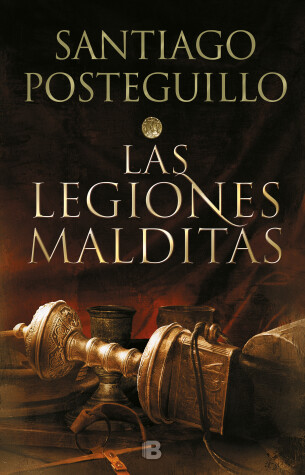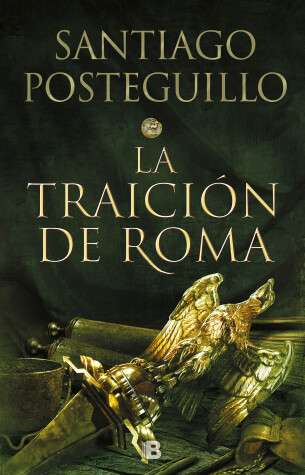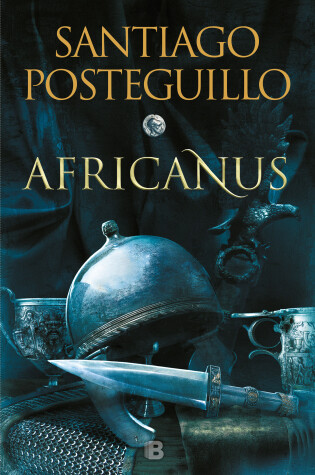Trilogia Africanus
2 primary works • 3 total works
Book 2
Las legiones malditas / Africanus:The Damned Legions
by Santiago Posteguillo
Published 22 December 2020
Segundo volumen de la trilogía iniciada con Africanus.
Déjate atrapar por esta trepidante novela sobre la guerra, el amor, la envidia, la amistad y la supervivencia.
Publio Cornelio Escipión, conocido por el apodo de Africanus, que era considerado por muchos el heredero de las cualidades militares atribuidas a su padre y a su tío, sólo tenía veintiséis años cuando aceptó comandar las tropas romanas en Hispania.
Pero de ellos no sólo había recibido estos magníficos atributos, sino también algunos enemigos, entre otros Asdrúbal, el hermano de Aníbal, y el general púnico Giscón, quienes harían lo posible por acabar con su enemigo y masacrar sus ejércitos.
En un fascinante relato que recrea un momento decisivo de la expansión de Roma, Santiago Posteguillo hace al lector cómplice y testigo de las batallas, conquistas y derrotas de Escipión y sus ejércitos.
ENGLISH DESCRIPTION
"Second volume in the trilogy that started with Africanus.
Get caught up in this fast-paced novel about war, love, envy, friendship and survival.
Publius Cornelius Scipio, known by the nickname Africanus, who was considered by many to inherit the military qualities attributed to his father and uncle, was only twenty-six years old when he agreed to command the Roman troops in Hispania.
Yet he received from them not only these magnificent attributes, but also some enemies, among others Hasdrubal, Hannibal's brother, and the Punic general Giscón, who would do everything possible to destroy his enemy and slaughter his armies.
In a fascinating story that recreates a decisive moment in the expansion of Rome, Santiago Posteguillo makes the reader an accomplice and witness to the battles, conquests and defeats of Scipio and his armies. "
Déjate atrapar por esta trepidante novela sobre la guerra, el amor, la envidia, la amistad y la supervivencia.
Publio Cornelio Escipión, conocido por el apodo de Africanus, que era considerado por muchos el heredero de las cualidades militares atribuidas a su padre y a su tío, sólo tenía veintiséis años cuando aceptó comandar las tropas romanas en Hispania.
Pero de ellos no sólo había recibido estos magníficos atributos, sino también algunos enemigos, entre otros Asdrúbal, el hermano de Aníbal, y el general púnico Giscón, quienes harían lo posible por acabar con su enemigo y masacrar sus ejércitos.
En un fascinante relato que recrea un momento decisivo de la expansión de Roma, Santiago Posteguillo hace al lector cómplice y testigo de las batallas, conquistas y derrotas de Escipión y sus ejércitos.
ENGLISH DESCRIPTION
"Second volume in the trilogy that started with Africanus.
Get caught up in this fast-paced novel about war, love, envy, friendship and survival.
Publius Cornelius Scipio, known by the nickname Africanus, who was considered by many to inherit the military qualities attributed to his father and uncle, was only twenty-six years old when he agreed to command the Roman troops in Hispania.
Yet he received from them not only these magnificent attributes, but also some enemies, among others Hasdrubal, Hannibal's brother, and the Punic general Giscón, who would do everything possible to destroy his enemy and slaughter his armies.
In a fascinating story that recreates a decisive moment in the expansion of Rome, Santiago Posteguillo makes the reader an accomplice and witness to the battles, conquests and defeats of Scipio and his armies. "
Book 3
La traición de Roma / Africanus: The Treachery of Rome
by Santiago Posteguillo
Published 19 January 2021
Última novela de la Trilogía de Roma, en la que descubriremos el épico final de dos de los personajes más legendarios de la historia: Escipión y Aníbal.
«He sido el hombre más poderoso del mundo, pero también el más traicionado.»
Así comienza Publio Cornelio Escisión sus memorias en La traición de Roma, para continuar con el final de dos de los más épicos personajes de la historia, Escisión y Aníbal.
Los eternos enemigos se encuentran una vez más en la batalla de Magnesia, un episodio casi desconocido dela historia de occidente. Pero además de batallas, el autor nos cuenta lo que ha sido de los hijos de Escisión; de sus enemigos, Marco Porcio Catón y de su aliado Graco; de la esclava Netikerty; de la prostituta Areté; de su fiel aliado Ledio; de Antíoco III, el rey de Siria; del ya anciano dramaturgo Plauto, que se pasea por las calles de Roma, y también de la mujer de Escisión, Emilia Tercia, digna hasta el final en medio de la mayor de las hecatombes públicas y privadas.
Con la electrizante prosa que lo caracteriza, Posteguillo nos transporta de nuevo a la antigua Roma para ser testigos privilegiados del ocaso de una vida tan intensa como desbordante: el final de la epopeya de Publio Cornelio Escisión y de todo su mundo en el marco incomparable de una Roma que emerge victoriosa, por encima de la historia, sin importarle arrasar en su imparable ascenso todo y a todos, incluidos a sus héroes.
ENGLISH DESCRIPTION
In this last installment of Posteguillo’s “Rome Trilogy,” we discover the epic ending of two of the most legendary characters in history: Scipio Africanus and Hannibal.
The trilogy now continues putting an end to two of the most epic characters in history, Scipio Africanus and Hannibal. These eternal enemies meet once again in the Battle of Magnesia, an almost unknown episode in the West’s history. But in addition to the battles, the author also tells us what has happened to Scipio Africanus’ children, his enemy, Marcus Porcius Cato and to his ally Graco; to Netikerty, the slave; to Areté, the prostitute; to Antiochus III the Great, king of Syria; to the old playwright Plautus, and also to his wife Aemilia Tertia, who held her head up high to the end in the midst of the greatest of public and private hecatombs.
With Posteguillo’s electrifying prose, he takes us back to ancient Rome to be privileged witnesses of the decline of a life as intense as it was abundant: the end of the Publius Cornelius Scipio Africanus saga and his world in the incomparable setting of a Rome that emerges victorious, without giving a care about destroying everything and everyone in its unstoppable rise, including its own heroes.
«He sido el hombre más poderoso del mundo, pero también el más traicionado.»
Así comienza Publio Cornelio Escisión sus memorias en La traición de Roma, para continuar con el final de dos de los más épicos personajes de la historia, Escisión y Aníbal.
Los eternos enemigos se encuentran una vez más en la batalla de Magnesia, un episodio casi desconocido dela historia de occidente. Pero además de batallas, el autor nos cuenta lo que ha sido de los hijos de Escisión; de sus enemigos, Marco Porcio Catón y de su aliado Graco; de la esclava Netikerty; de la prostituta Areté; de su fiel aliado Ledio; de Antíoco III, el rey de Siria; del ya anciano dramaturgo Plauto, que se pasea por las calles de Roma, y también de la mujer de Escisión, Emilia Tercia, digna hasta el final en medio de la mayor de las hecatombes públicas y privadas.
Con la electrizante prosa que lo caracteriza, Posteguillo nos transporta de nuevo a la antigua Roma para ser testigos privilegiados del ocaso de una vida tan intensa como desbordante: el final de la epopeya de Publio Cornelio Escisión y de todo su mundo en el marco incomparable de una Roma que emerge victoriosa, por encima de la historia, sin importarle arrasar en su imparable ascenso todo y a todos, incluidos a sus héroes.
ENGLISH DESCRIPTION
In this last installment of Posteguillo’s “Rome Trilogy,” we discover the epic ending of two of the most legendary characters in history: Scipio Africanus and Hannibal.
The trilogy now continues putting an end to two of the most epic characters in history, Scipio Africanus and Hannibal. These eternal enemies meet once again in the Battle of Magnesia, an almost unknown episode in the West’s history. But in addition to the battles, the author also tells us what has happened to Scipio Africanus’ children, his enemy, Marcus Porcius Cato and to his ally Graco; to Netikerty, the slave; to Areté, the prostitute; to Antiochus III the Great, king of Syria; to the old playwright Plautus, and also to his wife Aemilia Tertia, who held her head up high to the end in the midst of the greatest of public and private hecatombs.
With Posteguillo’s electrifying prose, he takes us back to ancient Rome to be privileged witnesses of the decline of a life as intense as it was abundant: the end of the Publius Cornelius Scipio Africanus saga and his world in the incomparable setting of a Rome that emerges victorious, without giving a care about destroying everything and everyone in its unstoppable rise, including its own heroes.
Con magistral precisión histórica y un excelente ritmo narrativo, Santiago Posteguillo presenta la historia de la infancia y juventud de Africanus, uno de los personajes más influyentes de Occidente.
¡MAGISTRAL! ¡IMPRESCINDIBLE! ¡UN AUTÉNTICO BEST-SELLER!
A finales del siglo III a. C., Roma se encontraba al borde de la destrucción total, a punto de ser aniquilada por los ejércitos cartagineses al mando de uno de los mejores estrategas militares de todos los tiempos: Aníbal. Su alianza con Filipo V de Macedonia, que pretendía la aniquilación de Roma como Estado y el reparto del mundo conocido entre las potencias de Cartago y Macedonia, constituía una fuerza imparable que, de haber conseguido sus objetivos, habría determinado para siempre el devenir de Occidente.
Pero el azar y la fortuna intervinieron para que las cosas fueran de otro modo. Pocos años antes del estallido del más cruento conflicto bélico que se hubiera vivido en Roma, nació un niño que estaba destinado a cambiar el curso de la historia: Publio Cornelio Escipión.
ENGLISH DESCRIPTION
With a masterful historical precision and an excellent narrative rhythm, Santiago Posteguillo offers the story of Africanus’ childhood and youth, one of the most influential characters in the West.
MASTERFUL! ESSENTIAL! AN AUTHENTIC BEST-SELLER!
At the end of the 3rd century B.C., Rome was on the verge of total destruction, about to be wiped out by the Carthaginian armies under the command of one of the best military strategists of all time: Hannibal. His alliance with Philip V of Macedonia, who sought the annihilation of Rome as a State and to split the world between the two great powers Carthage and Macedonia, was an unstoppable force that, had it achieved its objectives, would have forever changed the future of the West.
But fate and fortune intervened so that things would turn out differently. A few years before the bloodiest war that Rome ever lived, a boy was born who was destined to change the course of history: Publius Cornelius Scipio.
¡MAGISTRAL! ¡IMPRESCINDIBLE! ¡UN AUTÉNTICO BEST-SELLER!
A finales del siglo III a. C., Roma se encontraba al borde de la destrucción total, a punto de ser aniquilada por los ejércitos cartagineses al mando de uno de los mejores estrategas militares de todos los tiempos: Aníbal. Su alianza con Filipo V de Macedonia, que pretendía la aniquilación de Roma como Estado y el reparto del mundo conocido entre las potencias de Cartago y Macedonia, constituía una fuerza imparable que, de haber conseguido sus objetivos, habría determinado para siempre el devenir de Occidente.
Pero el azar y la fortuna intervinieron para que las cosas fueran de otro modo. Pocos años antes del estallido del más cruento conflicto bélico que se hubiera vivido en Roma, nació un niño que estaba destinado a cambiar el curso de la historia: Publio Cornelio Escipión.
ENGLISH DESCRIPTION
With a masterful historical precision and an excellent narrative rhythm, Santiago Posteguillo offers the story of Africanus’ childhood and youth, one of the most influential characters in the West.
MASTERFUL! ESSENTIAL! AN AUTHENTIC BEST-SELLER!
At the end of the 3rd century B.C., Rome was on the verge of total destruction, about to be wiped out by the Carthaginian armies under the command of one of the best military strategists of all time: Hannibal. His alliance with Philip V of Macedonia, who sought the annihilation of Rome as a State and to split the world between the two great powers Carthage and Macedonia, was an unstoppable force that, had it achieved its objectives, would have forever changed the future of the West.
But fate and fortune intervened so that things would turn out differently. A few years before the bloodiest war that Rome ever lived, a boy was born who was destined to change the course of history: Publius Cornelius Scipio.


